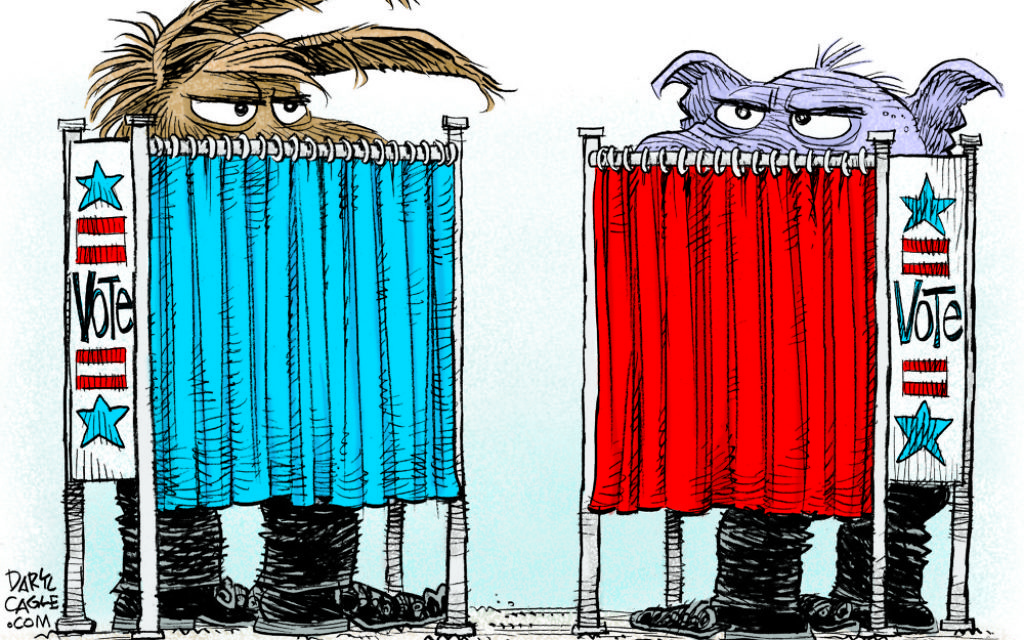Kehillat HaShem: Showing Respect to Right and Left
It's easy to figure out G-d's preference in the most recent elections.
I have been eligible to vote in many presidential elections, and I know many of you have been casting ballots longer than I. But I cannot remember a time when an election season was infected with more meanness, more divisiveness, more crassness and crudeness than 2016.
We were faced with possibly the two most unfavorable presidential candidates in the history of polling on candidates. Well over half of Americans expressed deeply negative views of both major candidates.
I’ve been wondering over these past several months how G-d would have voted if G-d happened to show up on Election Day at my polling station.
Get The AJT Newsletter by email and never miss our top stories Free Sign Up
I think there’s at least a chance that G-d is a Republican. After all, the Torah explicitly permits self-defense, even lethal self-defense, when your life is threatened. Capital punishment is prescribed for several crimes. The Torah is not shy about getting involved in intimate details of our personal lives. And there’s a robust nationalism and militarism throughout the Bible.
Not only all that, but G-d has spoken to Republican candidates and specifically told them to run: George W. Bush, Sarah Palin, even the Jewish Republican former-senator from Minnesota, Norm Coleman, who said on a radio show in 2008 that G-d wanted him to serve. But then G-d let Al Franken win his seat in that election, which makes me think that maybe G-d is a Democrat.
After all, there’s all the environmentalism of Genesis, l’ovdah u’leshomrah, that we must protect and care for the world. Leaving the corners of the fields for the poor to glean sounds like an ancient welfare system, and the mitzvah of paying workers their fairly earned wages on the same day sounds like the beginnings of union organizing.
Of course, the Torah is unquestionably concerned about caring for the ger, yatom, ve’almana, the stranger (some translate that as refugee), the orphan and the widow among us, so G-d may well be a Democrat.
That being said, though, about 40 percent of the Torah’s laws deal with property rights, and tzedakah is ideally meant to be given directly to the recipient, not through a proxy or government, so maybe G-d is a libertarian.
People ask me how I come up with what I want to speak about on the High Holidays. The answer is that I have to speak about what’s burning inside my kishkes. I have to talk to you about the issues I think are deeply important in this moment.
Also, I completely reject the idea that religion and politics don’t mix. If religion has nothing to say about the most important issues affecting society, then what good is it? If religion doesn’t help shape our national dialogue or our values, then what is it for? Judaism was never meant to be strictly an inward devotion or spirituality that is essentially personal and private.
Abraham, Moses and the Hebrew prophets all spoke out with righteous indignation about the injustices they witnessed. The only barrier that Jews erect between religion and politics is the one that protects people from practicing or not practicing whatever they choose.
We learn in Pirkei Avot, that great collection of early rabbinic wisdom, how our tradition defines someone who is wise. Eizehu chacham? Ha’lomeid mi-kol adam: “Who is wise? One who learns from all people — not just the people with whom they agree, but also, and especially, from the people with whom they disagree.”
I’ve got news for you: You can be a good Jew and be a Republican. You can be a good Jew and be a Democrat. You can be a good Jew and be a libertarian. Truth and goodness and justice do not exist in only one party or one ideology.
I am under no illusions that any candidate will be perfect or impeccable in every way. We did not elect a mashiach; we elected a human being, a flawed, imperfect human being. We may have different views about who the best candidate was or what those critical issues were that demand our support, but, for G-d’s sake, let’s have some respect for each other. Let’s have some humility and sensitivity for other people’s heartfelt opinions and views and stop questioning their patriotism or their character.
At the end of the Amidah, the standing prayer we recite morning, afternoon and evening, our practice is to take three steps backward as we say the words “Oseh shalom bimromav, Hu ya’aseh shalom aleinu ve’al kol Yisrael, ve’imru, amen.”
As we say this prayer, we physically step back, as if to say that we can only achieve peace when we are willing to take a step back and make room for other people, other opinions, other ways of understanding the world.
After we take those three steps back, we bow — but not just straight ahead as in other parts of the service, but to the right and then to the left. I want you to think about this the next time you finish the Amidah.
Maybe we are actually bowing to the people to our right and to the people to our left to demonstrate our honor for them and our conviction that achieving peace and harmony will happen only when we learn to respect not only those we agree with, but also the people who are to the right of us and the people who are to the left of us. Then and only then will the One who makes peace in the heavens make peace for us, for Israel and for all the world, as we say together amen.
L’shana tova.
Rabbi Jeffery Feinstein is the head of Congregation Kehillat HaShem.





comments